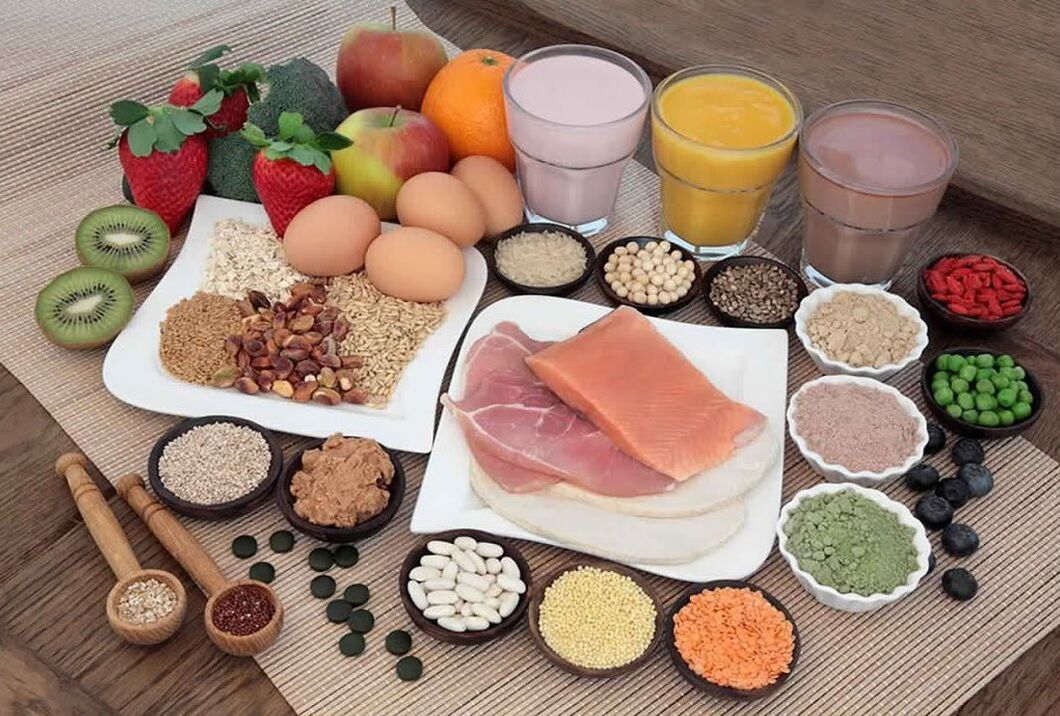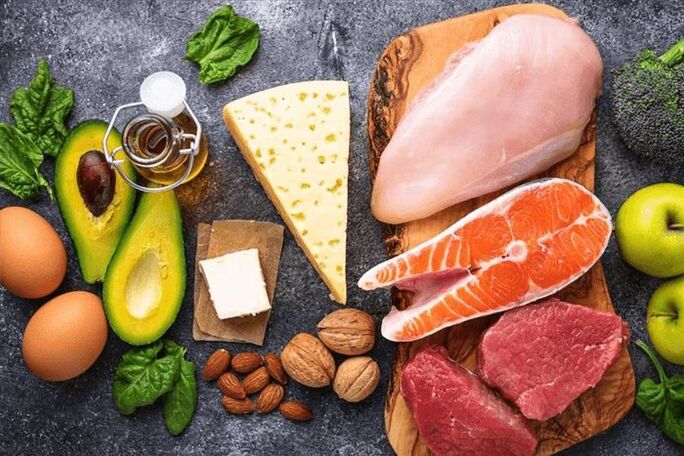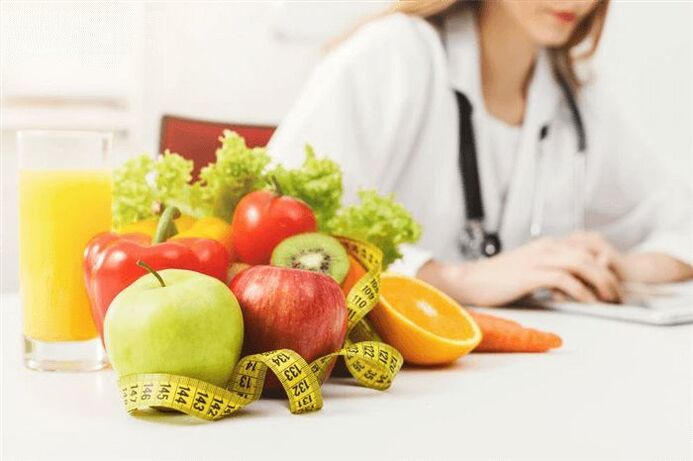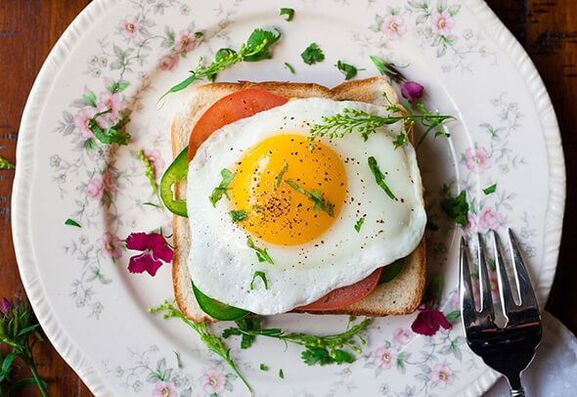First, let's try to figure out what a protein diet is and what its features are. First of all, it is worth saying that this diet is based on the high consumption of protein-rich foods: eggs, seafood, meat, fish, dairy products, legumes and cereals. It is worth minimizing the consumption of fats, and especially carbohydrates.
Many people think thatprotein dietquite difficult, however, this is not so. A huge advantage is the feeling of fullness with food, which is almost unrestricted. Now let's find out what foods you should eat in large quantities, since they will be your main diet.
What do you need to eat on a protein diet?
- Dairy products
- Meat and fish
- Low-fat yogurt and cheese
- pea's tree
- Vegetable
- Seafood
Foods that should not be included in a protein diet:
- Fast food
- Sweet fruits are high in calories
- Make cakes and desserts.
- Potato
- Full-fat dairy products
- Meat.
Why should you choose a high-protein diet to lose weight?
Proteins are the building blocks of our body, they contain a large amount of vitamins, macro and microelements. The problem for many people trying to lose weight is constantly crashing down from hunger. When on a protein diet, you will have enough energy and not always think about food. You will also not exhaust your body, it will look attractive because the muscle tissue will practically not be damaged. This is a great choice for those who want to get a toned body.
How does a protein diet work?
The problem is aboveDigestand the body expends a large amount of energy to digest protein-rich foods. To digest lean chicken breasts or egg whites, your body must use up stored fat. It is at these times that intense weight loss begins. To achieve maximum results, it is necessary to supplement at least minimal physical exercises.
No one talks about what you have to do all daydisappeared into the gymHowever, half-hour circuit training at home will help enhance the effectiveness of a high-protein diet.
Significant benefits of a high-protein diet. First of all, there is a huge selection of products available in many stores. You will not have a constant feeling of hunger but will be satisfied with food all the time and enjoy it. Agree, even a fairly well-cooked piece of lean meat seems much more appetizing than the freshest lettuce leaf or green apple. There are many recipes suitable for people who eat foods rich in protein.
Many people note the significant advantages of protein diets over other diets; Over time, you may even get used to this diet and it may become your lifestyle. After losing a certain number of kilos, you will gradually be able to add more of your favorite foods without gaining weight. But it is worth remembering that protein should still be the main product in your diet.
Disadvantages of protein diets. Of course, each method of losing weight has its disadvantages, but protein diets also have small disadvantages. The first and most important thing is that the products you need to eat regularly are not cheap. Seafood will cost you more than a dumpling or a pie that you can buy on the way to work. You will also have to spend more time preparing food. It won't be easy for those with a sweet tooth, as the protein diet hardly includes any desserts, with the exception of dried fruit and low-fructose fruits.
You'll need to carry containers with you to last you all day, especially if you spend a lot of time at work or school. A protein diet involves eating at least 5 times a day.

Fundamentals of a protein diet:
- Avoid high-calorie foods. It is necessary to exclude alcoholic beverages, fast food, baked goods, sweets, dried fruits can be an analogue. Sweeteners should also not be in your diet. Any food on your plate should be low carb. Don't forget that even a small amount of sweetener in a cup of coffee can cause strong cravings, leading to overeating.
- Drink more water. This refers to purified water, not various beverages such as coffee, tea or juice. When on a protein diet, you need to drink at least 2 liters of water per day. Carry a small bottle with you and refill it constantly, so you'll remember to take a few sips, even when you're away from home or work.
- Minimize your fat intake. If your diet contains fatty cheeses, fatty cottage cheese, nuts or avocados, consume them before lunch, so the body will spend energy on time and excess calories. will not be stored as fat. Protein-rich foods go well with cucumbers, tomatoes, broccoli and low-sugar fruits.
- Exercise strenuously. In any case, you will have to supplement your protein-rich diet with exercise. In this way, you will achieve the desired results faster, speed up your metabolism, improve the absorption of protein-rich foods and be able to burn more calories than you consume, and this is the secret to losing weight. healthy weight.
Who should think twice about choosing a high-protein diet?
First of all, the people who have itgastrointestinal diseases, as well as due to kidney failure. Protein diets are undesirable for older people, since the body has to process a fairly large amount of protein foods, and if there are openings in the heart or blood vessels, this idea should be completely abandoned. .
Sometimes illiterateUse a high-protein dietThe blood clotting process may change and therefore there is a risk of blood clots forming. So, get your blood tested first and do it safely so that losing weight doesn't cause health problems for you.
Protein diet for weight loss

The days of sun, relaxation, floaty clothes and bikinis are behind us. The beautiful ladies tried to relax a little and even treated themselves to something very delicious and no less "very" calorie-dense. There is no doubt that small joys will make everyday life brighter and more positive. The important thing is to tell yourself to stop at the right time! Otherwise, the appearance of excess weight is very rapid and, as weight loss experience shows, will bring instability, negativity and problems in your life for a long time.
But what if time is lost? How to quickly return to normal at home? Is a protein diet effective on a daily basis?
Does perfection have to be perfect?
Before talking about diets, let's find out whether there is such a thing as an "ideal weight". It seems that the answer is completely obvious, because the entire fashion and "healthy" lifestyle industry tells us every day about the need to meet certain standards of beauty andseems to be healthy. These ideals are not of our invention and certainly have nothing to do with our understanding of human nature or the biological mechanisms at work. Despite this, we are motivated in every possible way to strive for certain standards, achieving results in the pool, the gym and jogging on the streets. The tragedy of the situation is that we do things that are very suitable for our bodies, not because they bring satisfaction and benefits, but simply for the sake of compliance. We don't monitor our health, we don't monitor the signals our body gives us, we measure and weigh our bodies! And as a result, we only make the situation worse.
Everyone is inspired, realized and ready to take action, but where to start? And you need to start with your own definition of non-ideal weight. The same thing, unique to each of us, but causing the same feelings of inconvenience and dissatisfaction.
What is non-ideal weight?
Try entering a query into any search engine to determine your ideal weight and you'll get links to dozens of calculators and tables. And none of them will take into account:
- your heredity (genetic predisposition);
- presence of chronic diseases;
- the number of fat cells in your body and their ability to store fat;
- metabolism (metabolism) in your body;
- your lifestyle - the presence of stress, sleep and alertness, mobility, quality and your diet.
If you put everything together, it becomes clear that each of us has our own less-than-ideal weight. How to determine when to act? If you are experiencing one or more of the following, your weight is not at your ideal level:
Your weight has a negative impact on your health - your general health gets worse, you get tired faster, your joints and back feel uncomfortable for the first time, shortness of breath appearsCurrently, periodic increases in blood pressure and greatly affected bowel function are expected;
weight begins to make unpleasant adjustments in your life. You can't do your usual activities (anything that requires mobility and physical endurance), you have to limit your clothing, you feel awkward on public transportationpublic or crowded places, you begin to adjust your life and work plans to take your weight into account.
Remember, if you are serious about taking care of yourself, start by seeing a nutritionist and an endocrinologist. This will be the best thing you can do for yourself. Only experts in the field of medicine and proper nutrition can help you maintain your health and improve your quality of life. Don't forget the need for constant physical activity in your life.

What is a protein diet?
How can you adjust your menu to lose the kilos that are preventing you from living a fulfilling life? A high-protein diet can help solve this problem - the diet is based on protein-rich foods, as well as significantly limiting the amount of carbohydrates and fats. Applying this nutritional method, you can lose 14 kg within 3 months.
The basic principle of a protein diet is to eat foods containing protein that regulate metabolic processes in our body. In this way, it is possible to avoid the main drawback of any diet - a decrease in protein intake, which in turn leads to rapid depletion of the body (internal organs, not receiving enough protein, starting to get exhausted). they come out of muscle tissue). All this leads to weakness, poor physical health and sagging skin.
Benefits of following a high-protein diet
The advantages that distinguish a protein diet from any other type of diet look quite significant:
- maintain a healthy muscular system;
- the ability to combine diet even with serious physical activity;
- it is impossible to develop a painful complication such as anorexia;
- no feeling of hunger, fatigue, stress (protein food is absorbed by the body within 3-4 hours);
- Dietary dishes rich in protein include a large amount of fiber, which ensures the smooth functioning of the intestines;
- Because weight loss is quite slow and gradual, without much effort, it is possible to maintain the necessary weight after leaving the diet;
- good health - complete absence of weakness, dizziness and nausea, characteristic of other types of diets;
- Appearance blooms, the body truly rejuvenates - the condition of the skin, hair and nails improves.
It is important to remember that the maximum effect on the health of your body can be achieved only by observing the rules of nutrition in the diet combined with physical activity; All organs and their systems must be trained.
Disadvantages and contraindications of protein diets
When deciding to rebuild your diet according to the principles of a high-protein diet, remember - there is no ideal diet! Any diet is associated with certain restrictions or exceptions, which means that the load on your body will certainly increase. It is for this reason that one cannot help but mention the disadvantages of following a high-protein diet.
Protein diets should be short-term. Long-term consumption of protein-rich foods will lead to problems with the skeletal system (mainly consuming protein will lead to the excretion of calcium from bone tissue, making bones very fragile).
Prolonged carbohydrate restriction can negatively affect overall performance.
The nervous system is also attacked, reacting to the lack of a sufficient amount of fat in the diet - the main raw material for nerve cell regeneration. The main sign of this condition is increased anxiety and irritability.
A long-term high-protein diet can disrupt the balance of particles in the blood - the production of hemoglobin increases sharply.
Foods rich in protein leave behind a large amount of "decomposition products", which leads to an increased load on the kidneys (to excrete them).
Diet menu rich in protein
The protein diet menu should be built on the basis of several principles that ensure the achievement of the necessary result (for example, loss of 10 kg):
Protein makes up at least 60% of the total diet.
Refuse constant snacking, for this purpose, give preference to protein products with a long digestive cycle.
There should be at least 5 or 6 meals a day and the gap between meals should not exceed 3 hours.
Avoid frying; All dishes should be prepared by grilling, stewing or steaming.
To better balance your diet, you can add some vegetables and fruits to your diet.
Have regular physical activity on the body.

The main product of a protein diet
Chicken, turkey, veal, rabbit
Exceptions: lamb, pork (high fat content)
Low-fat fish
(not more than 4% fat)
Pink salmon, pollock, cod, navaga, perch, pike perch, grayling
Milk and fermented milk products should not exceed 3-5% fat
Kefir, yogurt, cheese, hard cheese
Rice, oatmeal, buckwheat
All "green" vegetables, as well as any other vegetables in small quantities, 2-3 times a week
Sour fruit drinks, unsweetened homemade juices and juices (diluted 1: 1 with mineral water), teas made from herbs and their infusions, unsweetened coffee
Olives, flax seeds, sunflower - in limited quantities
Among the products prohibited for consumption, several main products can be identified:
- flour products - pasta, cakes, bread;
- products and dishes containing sugar and sugar - baked goods, ice cream, chocolate, candy, ready-made juices, fruit drinks, etc. v. ;
- any sausage;
- potatoes and dishes containing them;
- alcohol and any products containing alcohol;
- fast food and industrial semi-finished products.
Important! Regardless of which high-protein diet option you plan to use (short-term or long-term), remember that fasting periods cannot be more than once every 6 months.
Protein diet: list of allowed and recommended foods
On a protein diet, the following are allowed:
- any meat - pork, beef, poultry with minimal fat content;
- seafood, eggs, low-fat cheese;
- raw vegetables: cabbage, cucumbers, herbs, tomatoes;
- Lemon juice or olive oil is used as a dressing;
- Oatmeal and buckwheat are allowed to be used 2 times a week.
- sweets - these are all confectionery products (cakes, cookies), sugar and sweet fruits;
- bread products, pasta, greasy fried foods;
- cereals, potatoes, butter.
When following a high-protein diet, you must follow these recommendations:
- you need to eat 5-6 times a day, the last time no later than 2 hours before bedtime;
- Drink at least 1. 5 liters of still mineral water or clean water daily;
- any alcohol is prohibited;
- If desired, a few citrus fruits or unsweetened apples are allowed as a snack.
What protein diet programs are there?
Quite a few protein diet programs have been developed. There are both pure protein diets and those with different variations: protein-vegetable, protein-fruit, protein-vitamin and others.
Protein diet for a week: menu options
Opt for a 7-day protein diet
1 option
- Breakfast: 150 grams of beef with a whole grain bread, a cup of tea or coffee;
- Snack: 1 apple;
- Lunch: boiled chicken breast (150 grams) with vegetable salad (200 grams);
- Afternoon snack: 1 cup low-fat yogurt or kefir;
- For dinner: boiled sea fish (200 grams) with vegetable salad mixed with lemon juice.
Option 2
- Breakfast: 150 grams of low-fat cheese, tea, coffee;
- Snack: 1 citrus fruit;
- Lunch: beef stew with vegetables (150 grams);
- Afternoon snack: 1 cup low-fat kefir with dietary bread;
- Dinner: 200 grams of boiled lean fish with fresh vegetables.
Option 3
- Breakfast: boiled chicken fillet (200 grams), tea or coffee;
- Snack: 1 apple;
- Lunch: 200 grams of boiled beans with a portion of vegetable salad;
- Afternoon snack: 200 grams of low-fat yogurt with diet crackers;
- For dinner: 150 g boiled beef with 150 g cabbage salad, season with 1 tbsp. I. olive oil.
Option 4
- Breakfast: 1 glass of low-fat kefir with dietary crackers;
- Snack: 1 unsweetened fruit;
- Lunch: 200 grams of boiled chicken breast, 1 glass of apple juice;
- Afternoon snack: 1-2 boiled eggs;
- Dinner: 200 grams of boiled fish, 150 grams of fresh vegetables.
Option 5
- Breakfast: 150 grams of boiled turkey, 1 apple, tea or coffee;
- Snack: 1 glass of apple juice, 1 diet cookie;
- Lunch: boiled fish (200 grams) with a piece of wholemeal bread;
- Afternoon snack: 1 glass of low-fat kefir;
- Dinner: 150 grams of boiled beef with vegetable salad.
Option 6
- Breakfast: 150 grams of low-fat cheese and tea;
- Snack: 1 grapefruit;
- Lunch: bean stew with vegetables;
- Afternoon snack: 1 glass of kefir;
- Dinner: boiled sea fish (200 grams) with fresh vegetable salad.
Option 7
- Breakfast: 1 glass of skim milk, 1 diet biscuit;
- Snack: 1 unsweetened apple;
- For lunch: vegetable soup with mushrooms;
- Afternoon snack: 50 grams of low-fat cottage cheese;
- Dinner: boiled beef (150 grams) with fresh salad.
Opt for a short-term (fast) protein diet (3 days)
The main feature of such a "fast" protein diet is the complete absence of snacks, strict adherence to 3 meals a day and the prohibition of any, even the slightest, physical activity. At the same time, it is allowed to drink unsweetened herbal tea between meals.
- breakfast - 1 boiled chicken egg, cooked in any form (hard-boiled, poached, etc. ), can be replaced with quail eggs, taking into account the calorie content;
- lunch and dinner - 150-200 grams of low-fat cottage cheese (no more than 3-5% fat) and tea without sweeteners (using sugar and honey is unacceptable);
- Fluid consumption - at least 2 liters per day;
- Last meal no later than 6pm.
When leaving a short-term protein diet, adhere to the principle of gradual increase so as not to harm your health, you must add food and increase the amount gradually over 1-2 weeks. Start by adding grains and fruit, then add milk and fermented milk products (see fat content).
Unfortunately, no matter how much we want it, it is difficult to call such a diet balanced, during the period of application of a protein diet (especially short-term), the bodyhave acute vitamin and mineral deficiencies. To minimize possible negative consequences due to such restrictions, about a week before the diet, start taking a vitamin complex designed for long-term use (from 1 to 3 months).
When deciding to start a high-protein fast, evaluate not only your current physical condition but also the emotional and intellectual stress that may occur during this period. Abandon the diet (or change it promptly) if:
- you have recently had a somatic illness;
- you are facing a period of severe physical, intellectual or emotional stress;
- you are over 50 years old;
- you have liver and/or kidney problems, as well as cardiovascular system;
- you have had (or currently have) a blood clotting disorder (increased risk of blood clots) and have signs of diabetes.
And of course, applying any diet is absolutely impossible during pregnancy and lactation.
If you want to schedule a protein diet menu for a longer period, for example, a month, then it is better to contact specialists. They can not only create a diet based on the permissible calorie content and list of allowed foods, but also make it as balanced as possible.
Dukan diet menu
Dukan diet also refers to a type of protein diet, according to the menu it is divided into various stages: attack, journey, protein-vegetable, consolidation, stabilization. The first phase of the attack is the most important, here is its approximate menu:
- Breakfast: 2 egg whites omelet with low-fat milk and some herbs.
- Snack: one and a half teaspoons of oat bran.
- Lunch: 200 grams of boiled veal.
- Snack: boil 200 grams of shrimp or other seafood.
- Dinner: 200 grams of boiled veal or lamb.
result
As a rule, the effect of losing weight with a high-protein diet becomes noticeable within a week, when the first 4-5 extra pounds are gone..The most noticeable results will be after three weeks, when more excess weight will disappear and muscles will be noticeably reduced. After all, protein diets are designed to eliminate fat deposits without losing muscle mass. Fortunately, there are enough protein products to restore and "build" muscles.
The greater the initial weight of the person losing weight, the greater the "weight loss" during the diet. For example, if you weigh 100 kg and are obese, you can lose 5 - 10 kg in two weeks. At the same time, the diet is quite diverse and will not cause an aversion to a particular product as is the case with a mono diet.
It is believed that the optimal period for which you can adhere to a protein-rich diet that is beneficial and does not harm your health is 10-14 days. During this time, you can lose 8-15 kg.

The right way to get out of a protein diet
Experts advise exiting any diet gradually. Protein nutrition systems are no exception. You should not immediately eat your favorite dishes, which are prohibited in the program. It is better to completely exclude sugar and flour products from your diet.
Besides, you must continue to adhere to the regimen: eat at least 5-6 times a day in small portions, do not eat 2-3 hours before going to bed, drink plenty of water and stop drinking alcoholic beverages.
During the first 2 weeks after a protein diet, physical activity should also be increased. This should be done for optimal use of incoming energy and maintenance of results.
Contraindicated
In order not to harm their health, people with the following diseases should abandon a high-protein diet:
- hepatitis (and other liver diseases);
- arrhythmia (and other heart abnormalities);
- kidney dysfunction;
- dysbiosis;
- colitis;
- pancreatitis;
- increased thrombus formation;
- Joint pain (and all related diseases).
In addition, the protein nutrition system is not suitable for the elderly, pregnant and lactating women.

































